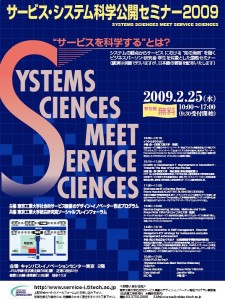When the Master’s program on International Service Business Management started up at Helsinki Metropolia University of Applied Sciences in 2006 — then it was Helsinki Polytechnic Stadia — I was one of the original authors for the curriculum. I happened to be in Finland in September 2006 and 2007, so I gave some of the early lectures.
My schedule in 2008 didn’t line up, but I did happen to be back in Finland in September 2009. Thus, I gave an updated version of the lecture in one of the first classes for the session. The content included:
- A. Introduction
- B. The changing world, and SSMED
- C. Service-dominant logic
- D. Service as a paradigm
- E. A smarter planet
- F. Artifacts / feeds to follow
The lecture ran just under 2 hours. I’ve posted the slides on the Coevolving Innovation Commons, under Publications.



